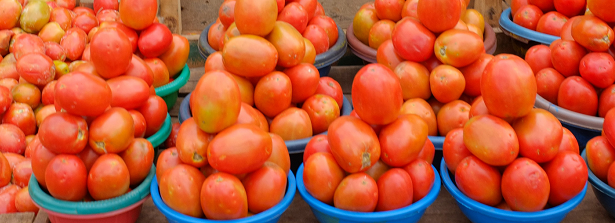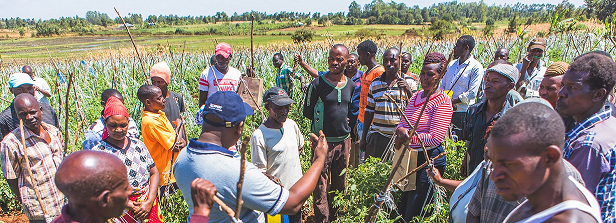Salvaging tomato production in Kenya from pests and diseases

Duration: August 2015 – July 2018. This project has been finalized.
Project information
Aim: Tomato plays a critical role in meeting domestic and nutritional food requirements, generation of income and creation of employment for both the rural and urban populations in Kenya. However, at the moment tomato production is facing serious challenges with Tomato leafminer (Tuta absoluta) and Fusarium wilt-root-knot nematode complex. Farmers are getting up to 80-100% crop losses due to this insect pest and disease complex. A team of scientists from Koppert Kenya, Koppert BV and Kenyatta University will develop, validate and disseminate Integrated Pest Management strategies that are effective, sustainable and adoptable to combat these menaces.
Objective: The general objective of this project is to improve tomato production in the peri-urban tropics through development, validation and dissemination of Integrated Pest Management strategies for Tomato leafminer (Tuta absoluta) and Fusarium wilt-root-knot nematode complex within smallholder farms in Kenya.
Specific objectives are:
- Establishment and authentication of the current status of diversity and identity of tomato leafminer (Tuta absoluta) and Fusarium wilt-root-knot nematode complex in Mwea Kenya.
- Management of Tomato leafminer (Tuta absoluta) and Fusarium wilt-root-knot nematode complex within smallholder farms in Kenya.
- Development, validation and implementation of integrated pest management strategies for tomato leafminer (Tuta absoluta) and Fusarium wilt-root-knot nematode complex with special emphasis on the use of biological control products.
Method: A cross-sectional survey will be conducted to establish and verify current status of diversity and identity of Tomato leafminer (Tuta absoluta), Fusarium wilt and root-knot nematode in Mwea Kenya.
Two sets of trials will be set up in selected farmers’ fields in Mwea region to demonstrate IPM strategies in management of tomato leafminer and fusarium wilt-root-knot nematode complex. Farmers will play a key role in assessing these strategies. The trials will be laid out in a randomized complete block design (RCBD) with three replications.
Different biological insect pest and disease management strategies for management of Tuta absoluta and fusarium wilt-root-knot nematode complex will be developed and validated through trials both in a greenhouse and farmers’ fields. This will entail use of monitoring (Delta traps+Pheromones) and mass trapping (Water traps, Sticky traps & Pheromones) strategies for Tuta absoluta and use of NatuGro System for fusarium wilt-root-knot nematode complex. Different product rates of application and combinations will be assessed in order to develop and recommend the most adaptable and sustainable strategy.
Country: Kenya.
Dutch policy goal: Increased sustainable agricultural production.
Progress reports
Year 2: During the second year of the project, we started off with a stakeholder’s workshop where we shared the results from the trials and survey in the first year with participants from various disciplines in the agricultural sector. The results from the survey showed clearly the magnitude of the losses and damage while the field and greenhouse trials showed that an integrated approach is the best way to manage Tuta absoluta and Fusarium wilt-root knot nematode complex problems. This was followed up by field demonstrations and scale up activities. Farmer participation and on-farm field demonstrations led to innovations where farmers are able to make their own traps for mass trapping of Tuta absoluta based on the training and knowledge gained. The results from this project contributes greatly to the development of an integrated pest management policy which many institutions and organizations have been working towards.
Year 3: First an inception workshop was helt, which brought together researchers, extension practitioners, private sector players, government organisations, NGOs and other development partners. Then a cross-sectional survey in Kirinyaga County – a major tomato growing area – done by Kenyatta University showed the current status of diversity and identity of two major tomato pests: tomato leafminer (Tuta absoluta) and Fusarium wilt-root-knot nematode complex. The research team identified Fusarium wilt and root knot nematode isolates from samples collected during the survey through morphological and molecular characterization. Also, information was collected and analyzed ranged from farm characteristics and farming practices including disease and insect pest control practices, general perception, use and adoption of biological control and Integrated Pest Management. Based on the survey and insights gained on farmers understanding of Tuta absoluta and Fusarium wilt-root-knot nematode complex, management strategies and dissemination materials are under development.
On-farm trials
Parallel to this, Koppert Biological Systems set up on-farm scientific trials to validate the developed Integrated Pest Management (IPM) packages for management of tomato leafminer and Fusarium wilt-root-knot nematode complex. The trial sites were set up on farmers’ fields in Mwea and Kagio sites in Kirinyaga County. The research team organised two farmer field days for 300 farmers, in April 2016, to showcase farmers and other stakeholders the different approaches of pest management. Developing and validating IPM packages for management of the above pests through on-farm scientific trials acts as an initial step towards fine tuning the most practical, appropriate and pro-poor strategies for managing the above mentioned pests. Two draft scientific papers are being reviewed and ready for submission to open access journals.
Final report
Summary of the results: The management of Tuta absoluta and Fusarium wilt- Root Knot Nematode complex using integrated pest management (IPM) has been studied with successful results. This was in a three year project funded by NOW-WOTRO and implemented by Koppert Kenya, Kenyatta University and Koppert Bv. The main objective of project was to improve tomato production in the peri-urban tropics through development, validation and dissemination of IPM for Tuta absoluta and Fusarium wilt-root-knot nematode complex within smallholder farms in Kenya. The results showed that the integration of mass trapping, botanical extracts, microbial insecticide and a chemical pesticide was effective in the management of Tuta absoluta. On the other hand, the integration of NatuGro system, a fungicide and a microbial nematicide was effective in the management of the Fusarium Wilt- Root Knot Nematode complex. Additionally, the IPM options had higher marketable yield compared to the use of chemical pesticide application only (Farmer practice). Training and knowledge sharing formed an integral part of the project that saw various stakeholders in the agriculture sector engaged through conferences, Radio programmes, social media platforms, workshops, field days, partnerships, on-farm training sessions, demonstrations and farm visits. Two scientific papers were also published from the results of this study.

